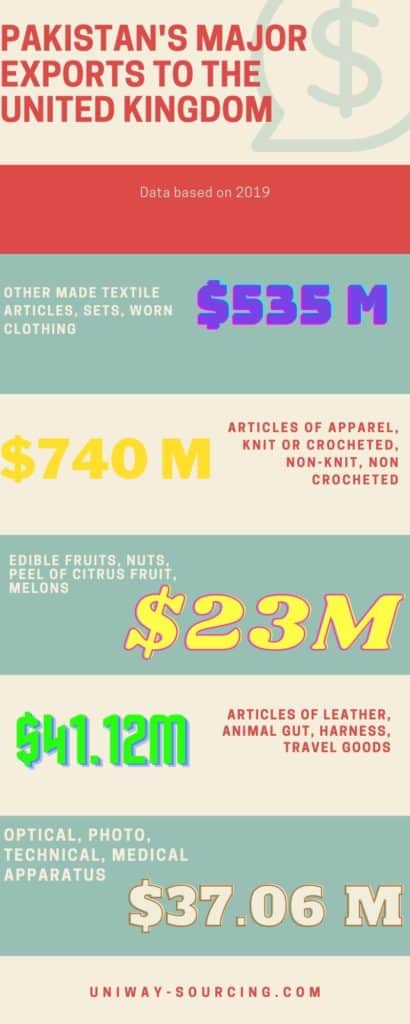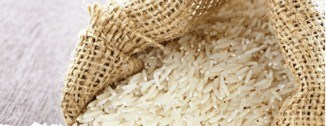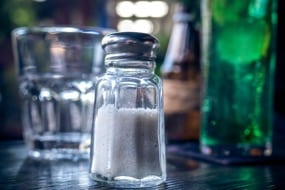Pakistan has been one of the largest exporters in the South Asian region with a global dominance in rice, textiles and apparel, surgical instruments, sports goods, and many other commodities. Although in recent years, Pakistan has seen a decline in its exports and its global dominance, the country has rebounded strongly even during the COVID-19 pandemic when other economies have contracted.
Pakistan, in December 2020, had consecutive growth in exports for four months and reached a value of 2.357 billion US dollars. This was a whopping 18.3 percent growth when compared with December of last year. These large exports have been primarily driven by a surge in the exports of the textile sector, engineering products, surgical instruments, and leather products.
Importing from Pakistan offers numerous benefits and advantages.
One is the low cost of products primarily due to a lower proportion of labour costs and high quality of the products; this means that the importers earn higher profit margins and still end with up a top-quality product to sell to their customers.
Two, Pakistan faces preferential duty rates under the GSP Plus scheme where many commodities and goods face a 0 percent trade tariff which again benefits the businesses when importing from Pakistan to UK. Three, the majority of exporters speak relatively good English which reduces the chances of miscommunication, reducing potential delays and costs for the importers.
All of this sounds delightful for importers in the UK; however, certain documents and prerequisites of importing from Pakistan to UK must be met. There are many formalities and requirements you must meet as an importer in UK so that the entire process is smooth and cost-effective.
These formalities include registrations, certifications, clearances, documents, and many other hurdles to go through. Please understand that without meeting the specific requirements for each type of goods, you will face a lot of troubles and inherently damage your business performance.
As such, in this article, we will cover the important information that you need to know before importing from Pakistan to UK and also go through the process of importing mangoes, apparel & clothing, rice, furniture, surgical instruments, bedsheets, birds, and salt from Pakistan to UK. So that you are fully equipped to import your products from Pakistan to UK hassle-free.

What do you need before you can start importing goods from Pakistan to the UK?
In this section of the article, we will cover the main requirements and things that you must consider when importing goods from Pakistan to UK. We will discuss the EORI number required, goods restrictions and import licenses, customs agents, commodity code, goods declaration & the CHIEF system, labelling and marking requirements, VAT payment, and provide an overall conclusion.
EORI Number
EORI number is an abbreviation for Economic Operator Registration and Identification number and is used for importing and exporting any commercial goods to and from outside the EU. It is used for many other reasons as well as it conveys information about your goods to the customs, used for internal usage in the Her Majesty’s Revenue and Customs (HMRC), and general security.
You need to have an EORI number that starts with “GB”. An absence of an EORI number causes increased costs and delays for you as the HMRC cannot clear your goods and therefore you must pay additional storage costs. You need it to make the customs clearance as well through the CHIEF system (discussed below).
You need the VAT number and date of registration on your certificate if you are registered, Unique Taxpayer Reference (UTR), business commencement and SIC Code, and other credentials. Contact Uniway Sourcing for further assistance.
Goods restrictions and import licenses/certifications
Certain goods are either banned, restricted, require import licenses of some sort and some do not have any such regulations.
The following goods are banned for import into the United Kingdom:
- Self-defence sprays;
- Controlled substances;
- Assaultive weapons (switchblade knives);
- Endangered animals or species;
- Individual imports of meat and dairy;
- Immoral or indecent items.
The following goods are restricted and require a special license to import:
- Firearms and ammunition;
- Explosives;
- Food and plants (with pests, diseases, not for personal issue, and not grown in the EU);
- Infringement of intellectual or design rights (may lead to seizure of goods and legal prosecution).
Certain goods such as fruits, surgical instruments, and animals require special import licenses, certifications, or similar documentation. We will cover these below as well.
Customs Agents
A transporter or a customs clearance agent is an individual or person that is responsible for the entire customs clearance process and speeds it up with stringent compliance and assistance with the relevant laws.
Uniway Sourcing recommends that you should hire a customs agent to deal with the entire customs process and also transport the goods for you as it becomes too technical at times. Although, there is no compulsion to do so and if you are comfortable in doing so, you may do it yourself. However, most businesses that import do use such an intermediary.
Commodity Code
A commodity code is a 10-digit number that is given to all goods being imported for classification, calculation of VAT and duty, and other statistical and security purposes. The commodity code also is needed for customs declaration, alerts for any restrictions and licenses, and other policies, etc.
You can use the Trade Tariff Tool to find this commodity code for your good. However, it is hard to classify at times so you may ask us for advice.
The CHIEF system
The Customs Handling of Import and Export Freight (CHIEF) system is a national database of all the imports and exports of the United Kingdom through any transport means (air, sea, rail, and road). The CHIEF system has made the entire customs formalities submission very efficient as all of these can be completed online and it alerts for any errors or abnormalities.
Under the CHIEF system, importers can submit declarations and expedite the entire process. Many other formalities can be completed through this system and therefore it is a very important aspect of the entire the import process as many other things are all interconnected with the CHIEF system.
Labeling and Marking
There are certain labeling, marketing, and marking standards that must be complied with whenever importing certain types of goods.
Manufactured goods are subject to product markings. Food & drink and organic food are subject to labelling standards. They are also subject to marketing standards which we will discuss below.
VAT and Duty Payment
When you are importing, you must pay your VAT and duties on the goods. Before doing so, you must ensure that you have worked out the value of your goods correctly, otherwise such issues can lead to incorrect payments and delays. There are 4 methods to calculate the value of your goods correctly which are a bit cumbersome.
You should also check whether if you can benefit from certain preferential duty rates. Since Pakistan falls in the GSP Plus program, it enjoys 0% tariffs on many goods.
You can check all of the amounts using the commodity code under the Trade Tariff tool. Please note that it is very important that you keep the invoice with you for future reference.
To Summarise
In conclusion, this entire process can be lengthy from different digits such as commodity codes, EORI numbers to different systems and formalities & documents that need to be submitted. At times, this all can be very overwhelming for new businesses. Consequently, most businesses hire certain agencies to assist them in this process. As such, this is why we recommend having sourcing agents on board with you.
This is where Uniway Sourcing steps in. We will assist you in the entire process from customs formalities to customs clearance to transportation to your destination.
Importing Mangoes from Pakistan to the UK

Pakistani mangoes are renowned all around the world for being aromatic, sweet, and juicy. The country is the sixth-largest exporter of mangoes around the world with 1.7 million tonnes being exported annually and has over 250 different varieties. In the fiscal year of 2019-20, Pakistan exported 104 million US dollars’ worth of mangoes which was a 33 percent increase over last year. The major export destinations included the United Kingdom.
In this section, we will discuss the TARIC code, the preferential duty rate, the CHIEF system and DUCR code, GMS, Certificate of Conformity and PEACH system, and lastly, provide a conclusion.
TARIC Code
The TARIC code is a 10-digit code that is used all around the European Union as a standardised reference number about a product. The TARIC code tells the importer the rate of duty, any particular alerts about restrictions or embargo, and the relevant authorities’ contacts.
As an importer of Pakistani mangoes to UK, you can use the UK Trade Tariff Tool to find out the TARIC code for your import of mango. In addition, under this code, you can find all the important information in the same tool. The tool is updated regularly with the latest information.
Mangoes’ TARIC code is 0804500000. We strongly advise and urge you to re-check this again in the tool or with us because information can change. Presently, 0% VAT is imposed on this product. Certain requirements are present including a phytosanitary certificate (UN/EDIFACT format) from the Department of Plant Protection, Ministry of Food & Agriculture, Pakistan. A certificate of inspection is also required under document code C644.
Preferential Duty Rate
As aforementioned in the introduction part, Pakistan is in the GSP Plus scheme of the United Kingdom where it faces reduced or no tariffs on many products. The Mangoes imported from Pakistan to UK face a 0.00% duty. We strongly advise and urge you to re-check this again in the tool or with us because information can change.
CHIEF System and DURC Codes
As explained above, the CHIEF system allows importers to communicate and deal with customs electronically in order to make the entire process more efficient. For importers, CHIEF will produce a Declaration of Unique Consignment References (DUCR). This code will be used in the PEACH system and other customs-related services which will allow an automatic license verification system to be used.
General Marketing Standards (GMS)
Because mangoes do not fall under specific marketing standards and do not necessarily require a certificate of conformity, the fruit as such falls under the general marketing standards.
The standards require the produce to be intact, not rotten and sound, clean, “practically” free of any pests, damaged by pests, any abnormal moisture, external/abnormal smell, or taste, and moderately developed & ripe.
As for the labelling requirements, the produce must be having the country of origin printed. If sold pre-packed, the produce must have the country of origin, details (name and address) of the dispatcher, net weight, OR number of items.
If sold boxed, must have the country of origin in full and details of the dispatcher.
Certificate of Conformity and the PEACH system
Although mangoes do not necessarily require the certificate of conformity, Uniway Sourcing strongly advises and urges you to attain this certificate. This is because the HRMC authority checks 1% of the fruits falling under general marketing standards like mangoes. If inspected, you must present the certificate and it will cause delays and costs if not made beforehand.
This is where the PEACH system steps in. It is referred to as the Procedure for Electronic Application for Certificates from the relevant authority of the UK for regulating imports of fresh produce or plants. You can apply for the certificate of conformity using the PEACH system.
Conclusion
Importing mangoes from Pakistan to the UK can be a very lucrative business. However, there are many requirements to follow in order to do so smoothly and efficiently and to avoid any unnecessary costs & delays to maximize business performance; these have been highlighted above.
Importing Apparel and Clothing from Pakistan to the UK

Pakistan is one of the largest apparel and clothing exporters all around the world, in fact, it is the 8th largest one in Asia. The textile sector exported upwards of 6 billion US dollars in 2020 and has managed to grow during the pandemic rather than shrinking like other competitors in the region. In the year 2019, Pakistan exported 1,274.97 million US dollars’ worth of apparels and clothing to the United Kingdom.
The country’s many textile manufacturers have always had excellent partnerships with many top-notch clothing chains around the world including Adidas, Giordano, Zara, Mango, and many more.
In this section, we will discuss the requirements on importing apparel and clothing from Pakistan to UK, commodity codes & trade tariff tools, certificate of origin, preferential duty rates, samples, brand names, and provide a conclusion.
Requirements on importing apparel and clothing from Pakistan to UK
Certain clothing and apparel articles require an import license which permits the import from Pakistan to UK. Once you obtain the commodity code for your particular apparel or clothing product/goods, you must contact the Department for Business, Enterprise, and Regulatory Reform (BERR) with Pakistan as country of origin and the commodity code.
Certain licenses such as animal health certificates and import control on cat and dog fur on different types of textiles are required. It is imperative that you consult with us or the Trade Tariff Tool in order to familiarise yourself with such differing requirements in order to avoid any unnecessary delays or costs that can hurt your business’ performance.
Commodity Codes
As with any products or goods being imported to UK from any country, certain commodity codes are attached to each type of product. These codes perform many crucial functions that allow a smooth process of importing from Pakistan to UK.
Clothing and apparel have the largest section of the HRMC’s Customs Tariff list as it covers two entire chapters including 61 and 62 which are furthered divided into 17 sections and the commodity codes for different types of clothing and apparel range from 6203 to 6212. The sections are then divided under subsections under the type of materials, woven or non-woven, and printed or not printed.
Duty Rates and VAT
The clothing and apparel articles face duty rates and VAT. The duty rates are 12.00% and there is a 0.00% tariff preference.
The VAT rate imposed on clothing and apparel is 20.00%. However, please note, according to VAT Notice 714, Babywear and Children’s clothes & footwear are subjected to only 0.00%. This is the only type of clothing and apparel that are exempted from the VAT.
Commercial Samples
If you want to import commercial samples, you may be eligible for VAT and tariff relief. In order to claim this relief, you must be a commercial entity or a public entity recognised by the HRMC authority. Such goods must only be intended to be used as samples and follow certain requirements.
There are four methods to prepare your goods to be imported as commercial samples. Method A requires altering the items; method B requires labelling the good as “commercial sample” with a permanent marker; method C requires limiting the number of items; method D requires to present the goods in a way that shows the intention of the goods being used as commercial samples.
The HRMC authority expects the importer to meet either or both methods A and B. If you are unsure about what methods to use, you should contact us or the National Imports Relief Unit of the UK.
Brand Names
It cannot be emphasised enough that you must ensure that you do not import counterfeit products to the UK from Pakistan. This is because the Customs Authority of UK is always on the lookout for such imports, and regardless of the transport method, the goods will be examined and checked against a database. If the database does not contain the name of the rights holder and the products are counterfeit, they will be seized, and you will be liable for prosecution.
Conclusion
Importing clothing and apparel from Pakistan to UK is a straightforward process if the rules and regulations are followed thoroughly. However, these rules and regulations are sometimes very vast and complex which requires the assistance of an expert. From commodity codes to commercial samples, it has all been covered in this section.
Importing Rice from Pakistan to the UK
Pakistan is one of the largest rice exporters in the world, it is the fifth country with the highest dollar value worth of rice exported with a solid share of 5.6% of total world rice exports. It is one of the most important export commodities of the country and is a major source of earning for the country. Pakistan exports two main varieties of rice including the Basmati and the IRRI.
The United Kingdom (UK) is the second largest importer of Pakistani rice with a dollar worth of up to 89 million US Dollars in 2019, these are primarily basmati rice.

Requirements on importing rice from Pakistan to the UK
Usually, importing rice from Pakistan to the UK does not require an import license. However, if the consignment of rice has a net weight of more than 1000 kg/1 tonne then an import license is required which is issued by the Rural Payments Agency (RPA) and can only be applied with the application form issued.
In addition, you must also present a certificate of inspection for organic products (document code C644) after which your export will be allowed if the product is labelled and marketed as organic.
Commodity Codes
Section 1006 of the HRMC Customs Tariff relates to rice. It divides the rice into twelve categories of rice including husk (paddy or rough), for sowing, and other and other nine categories which can be found on the Trade Tariff tool.
As for the main rice export of Pakistan which is the basmati rice, the commodity code is 1006306792.
Duties
The Basmati and other rice imported from Pakistan to UK are subject to 0.00% VAT. However, there is an import duty of 121 GBP per 1000 kg being imported to the UK.
Please note that you may be eligible for an import duty relief. If your basmati rice is of a certain grade and you are able to attain a certificate of authenticity, then you may claim relief from the Rural Payments Agency (RPA). Please contact them for further information on this particular concern.
Conclusion
Rice is one of the major exports of Pakistan and the UK is the second largest importer of rice from Pakistan. There is no extensive or complex list of requirements or licensure to import rice from Pakistan to UK, therefore, making it an easy process.
Importing Furniture from Pakistan to the UK
According to reports, Pakistan’s furniture exports equated to about 51 million US dollars in 2011 (latest figure). The furniture industry has been growing and many new companies are entering the competition. Although the exports of furniture from Pakistan do not dominate at any scale globally, the industry has a great potential to become a major player in the global furniture industry which exceeded 609 billion US dollars in 2019 and shows massive growth potential as per many different market intelligence reports.

In this section, we will cover the requirements of importing furniture from Pakistan to the UK, discuss design issues, damages & returns, commodity codes, duties, and provide an overall conclusion at the end of this section.
Requirements of importing furniture from Pakistan to UK
There are no certain requirements or licensure required to import furniture from Pakistan to UK. However, if you are importing wood material or other products, there is a long list of requirements, inspections, and certifications that must be fulfilled before the product can be allowed in UK. Please consult Uniway Sourcing for further assistance if you plan to import such types of products.
Please note that any goods used for torture or repression are prohibited.
Design Issues
It is very important that you take care that the furniture you are importing is not a copy of an original design which will be an infringement, and therefore, can lead to seizure of the products and prosecution which will definitely harm your business performance significantly.
As such, we recommend that you must ensure that the supplier of furniture you are using does not have any design infringement issues. You may try signing a contract with them that has a clause specifically referring to this issue or go with a furniture maker that designs on their own. You may contact Uniway Sourcing for further assistance in this issue.
Damages and Returns
If you receive a damaged product and return it, you can claim an import duty and VAT relief from the Customs Authority of UK. There are certain requirements for this which include re-importing the given article within 3 years, no major alterations been made to the article which would upgrade the value of such article, must have been in free circulation previously, and many other requirements.
Commodity Codes
As with any product that you plan to import, you must always check the commodity codes and any related information through the very helpful Trade Tariff tool provided by the HRMC UK.
The furniture product is classified under code 94 with 9 subdivisions depending on whether it is a wood product or not, used for bedroom, office, or kitchen, or if it is a part or whether it is plastic furniture etc.
Duties and VAT
The furniture products are subjected to a 20.00% VAT. However, there is a 0.00% import duty on furniture products when importing from Pakistan to UK.
Conclusion
Furniture, although not the largest export industry of Pakistan, shows great potential and there is a great variety of furniture products from Pakistan with a relatively lower cost. There are no long lists of requirements for importing furniture which makes it an easy process overall for businesses in the UK.
Importing Surgical Instruments from Pakistan to the UK
Pakistan is one of the leading surgical instruments exporters around the globe. The nation exported around 250 million US dollars’ value worth all around the globe. The manufacturing of these surgical instruments is mostly clustered in the city of Sialkot and the instruments manufactured are renowned for being top-quality but also low-cost. A different variety of such instruments are manufactured in Pakistan including medical, surgical, dental, orthopedic, and other X-ray related appliances.
The United Kingdom is one of the largest importers of surgical instruments from Pakistan with holding upwards of 6% of the entire share.

Requirements of importing surgical instruments from Pakistan to UK
Since the usage of surgical instruments is in very delicate environments, there are no requirements for importing surgical instruments to UK.
Firstly, the surgical instruments require CE marking. To attain this mark, the products you are importing must follow a certain directive with regards to the safety, quality, and performance of the surgical instruments being imported. It also includes obtaining the ISO 13485 certification.
Your products can additionally although not required comply with the EN 60601 standards and other social & ethical standards which can help in obtaining the CE marking.
Secondly, the products must comply with quality, labelling, materials, and packaging requirements as well which we will cover below.
Quality and Labelling
The surgical instruments being imported must comply with the Medical Devices Directive 93/42/EEC which we have already covered above.
As for labelling, there are certain requirements. The label must contain the name and address of the manufacturer or authorised entity/person/representative, information about the contents, the world STERILE, method of sterilisation, any special instructions or warnings, handling requirements, an indication of single-use, and serial or batch number. There are still some additional requirements, please contact Uniway Sourcing for further guidance.
Materials and Packaging
The materials used in the process of surgical instruments may be stainless steel, molybdenum, titanium, chromium, or vanadium.
The packaging is subject to stringent requirements. It should be sterile in compliance with EN868 and test procedures must have been performed as well. A voluntary similar standard is the ISO 11607, it is not mandatory as EN868 is.
There is also some additional waste and recycle related packaging requirements.
Commodity Codes
The surgical instruments are covered under Chapter 90 of the Customs Tariff and are a very long chapter with many sections which are up to 33 and further sub-sections. These are divided according to the usage and type of the surgical instrument. Please consult with Uniway Sourcing or the Trade Tariff tool to ensure that you have the right commodity code for your product.
Duties
The surgical instruments are subjected to a 20.00% VAT. However, there is no i.e. 0.00% import duty imposed on most of the surgical instruments covered under Chapter 90.
Conclusion
Pakistan is one of the largest exporters of surgical instruments and the quality is considered to be top notch with costs relatively lesser than the similar sophisticated counterparts. Although there is a long list of requirements, most of them depend on the manufacturer so selecting the right surgical instruments manufacturer in Pakistan becomes very imperative in this industry.
Importing bed sheets from Pakistan to the UK
Bedlinen exports form one of the largest parts of the overall textile exports of Pakistan. The country is also one of the biggest textile manufacturers and exporters in the world. In the year of 2014, Pakistan exported 316,417 tones with a value worth upwards of 2,138 million US dollars. The bedwear exported by Pakistan is priced relatively low which translates into lower costs for business and therefore higher profits.
The United Kingdom imported 478 million US dollars’ worth of bedlinen from Pakistan. This has grown steadily from 2011 and is expected to continue to grow. In this section, we will discuss the requirement of importing bedsheets to UK from Pakistan, commodity codes, duties, samples and provide a conclusion.
Requirements of importing bed sheets from Pakistan to UK
There are no certain requirements for importing bed sheets from Pakistan to UK. Please ensure that you do have a customs agent/broker in order to expedite the customs clearance process.

Commodity Codes
The bedsheets/linen falls under chapter 63 of the Customs Tariff. The bed linen is in section 02 and subsection 02. The commodity code of the section for bed linen whether printed, knitted, or crotched is 630210000. Please consult with Uniway Sourcing or the Trade Tariff tool to ensure that you have the right commodity code for your product.
Duties
Bedlinen is subjected to 0.00% VAT. However, because Pakistan is in the GSP Enhanced Framework program of the United Kingdom, it is subjected to 0.00% duty. Please re-check with the Trade Tariff tool or consult with Uniway Sourcing to confirm this information as it is regularly updated to reflect any changes made.
Samples
You may able to claim relief from VAT and import duty if you are importing a commercial sample. Please refer to our apparel and clothing commercial samples section for further details.
Conclusion
Pakistan remains as one of the largest bedsheet manufacturers and exporters, although this has seen a decline, nevertheless the country continues to export at relatively low prices and good quality. The process of importing bedsheets from Pakistan to UK is not complex at all.
Importing Birds from Pakistan to the UK
Pakistan has a very long and diverse list of bird species. Each is very special and many only natives of Pakistan. In this section, we will cover the different requirements of importing birds from Pakistan to the UK, discuss country of origin & breeding facilities, pre-export testing, health certificate, ID and Travel container, keeping & releasing non-native birds & quarantines, endangered species & CITES, commodity codes, duties, and provide an overall conclusion.
Requirements of importing birds from Pakistan to UK

In many cases, you are required to present an import license for importing a bird from Pakistan to UK. Many additional requirements must be met before birds can be imported from Pakistan to UK. Since these animals can host many diseases and potentially harm the ecosystem of the UK, the import of birds is highly regulated. We discuss the requirements in the upcoming sections below.
Country of Origin and Breeding Facilities
There is a list of approved countries of origin from where captive birds are authorised to be imported from which is listed in Annex I to Retained EU Regulation 798/2008. This needs to be checked regularly and before imported as changes are made frequently.
In addition, the birds must come from authorised breeding facilities in the country of origin. Besides this, the birds must have been present in the breeding facility for at least 21 days before export or hatching.
Pre-Export Testing
The birds must be tested for certain viruses at least 7 to 14 days prior to the export. The birds must test negative for any avian influenza or Newcastle disease. In addition, the birds should not have been vaccinated against avian influenza. The process and procedure of testing are also defined precisely by the Animal & Plant Health Agency.
Health Certificate
Effective 1 January 2021, the UK requires that the birds being imported be presented with an animal health certificate. These can be found on the UK GOV website and their codes are Certificate 139/2013 GBHC027X and Certificate 139/2013 GBHC027E.
ID and Travel Container
In accordance with Retained EU Regulation 865/2008, the birds must have an individual identification number through a uniquely marked leg-ring or microchip.
The structure of the ID number should be that the ISO code of the country exporting and the unique serial number be included. This same ID number shall be reflected on the mandatory health certificate aforementioned and also on the container in which the bird being transported. These containers must always be new.
Quarantine
All birds being imported from Pakistan must quarantine for at least 30 days in an approved facility in the United Kingdom. The birds must be transported directly from the Border Control Post to the quarantine facility. A veterinarian will inspect the birds at the beginning and end of the quarantine time and if necessary additional inspections may be carried out by the same.
Please note all quarantine and inspection costs will be borne by the importing party.
Endangered Species and CITES
Certain birds being imported into the UK may be required to be registered and require a license under the Convention on International Trade of Endangered Species. Such permits should be issued in advance and may take up to 15 working days to be processed, this should be kept in mind by the importing party in the UK as it will cause delays and costs otherwise.
Please contact the Animal & Plant Health Authority for further assistance on this matter.
Commodity Code
The live birds are listed under chapter 01, section 06, subsection 31 (01063100) which are further divided into more divisions depending on the type of birds.
Duties
The birds are subjected to 20.00% VAT. However, there is a 0.00% duty on the birds being imported. Please re-check with the Trade Tariff tool or consult with Uniway Sourcing to confirm this information as it is regularly updated to reflect any changes made.
Conclusion
Importing birds from Pakistan to UK can be a very lengthy and overwhelming process because of the number of requirements and the sensitive nature of the product being imported.
Importing Himalayan Rock Salt from Pakistan to the UK
Pakistan exported up to 49 million US dollars’ worth of salt in the year 2019. Although this was a decrease of 4.2% from last year, it is expected to rise once again after the world enters into a recovery stage following the COVID-19 pandemic. One of the largest shares of salt exports from Pakistan is taken up by the famous Himalayan or Pink Salt which is considered to be superior all around the world and used as a healthy alternative. Pakistan stands proud behind this as it is one of the, if not, the only Himalayan salt producer in the world.

Pakistan exported up to 3.42 million US dollars’ worth of salt to the United Kingdom with a share of 6.92% as it stands as the second top export destination of Pakistan’s salt exports. In this section, we will cover many different aspects of importing salt from Pakistan to UK including the requirements, Food Standards Agency requirements, SaltAS certificate, commodity codes, duties, samples, and conclusion.
Requirements of importing Himalayan Rock salt from Pakistan to the UK
The imports of salt or similar products are subject to certain food hygiene and ingredient standards. There is no necessary need for an import license for this matter. We will discuss the FSA standards below.
Additives, Labelling, Packaging, and other FSA standards
There are certain requirements on any additives being used in any salt or anti-caking products when importing from Pakistan to UK. In order to obtain more information on this, you may contact Uniway Sourcing or the Food Standards Agency’s additives team.
The labelling for food is also defined by the Government of the UK. The label of your salt products being imported must be clear, concise, and easy to understand. Moreover, it should remain permanent, be easy to read, be visible, and not be misleading in any way or form.
You are also required to show the compositional i.e. ingredient structure of the salt products and certain basic information including the name of the food i.e. salt, expiry dates, any necessary warnings or precautions, net weight info, special storage requirements, batch number, and any particular instructions for cooking or otherwise.
The FSA also sets food hygiene and contaminants standards, you may contact Uniway Sourcing or the Food Standards Agency’s additives team.
SaltAS Certification
The UK has a Salt Association which also issues a SaltAS Certification. This certification of the product stands as a testament and an assurance scheme to the users that the given salt product complies with all given required hygiene and other standards.
Although this certification is not required, it is required by many industrial customers whenever using. It also assures the customers about the quality, and therefore, it is recommended if can be afforded.
For further information, please check the website of the Salt Association UK.
Commodity Code
Salt is listed under Chapter 25, section 01. The commodity code is 2501003100 with further divisions depending on the type and usage of the salt.
Duties
The salt products are subjected to 20.00% VAT. However, there is a 0.00% import duty. Please re-check with the Trade Tariff tool or consult with Uniway Sourcing to confirm this information as it is regularly updated to reflect any changes made.
Conclusion
Pakistan is the sole producer of the Pink Salt famous all around the world, the process is not complex at all with a few requirements which can be sorted with a relevant agency such as Uniway Sourcing.
Do you need help importing Products From Pakistan to the UK?
As a sourcing agent in Asia, We can help you with:
- Specifications
- Finding suppliers and negotiating
- Sampling
- Placing your order
- Quality control and testing
- Shipment
Use the form below to get in touch
